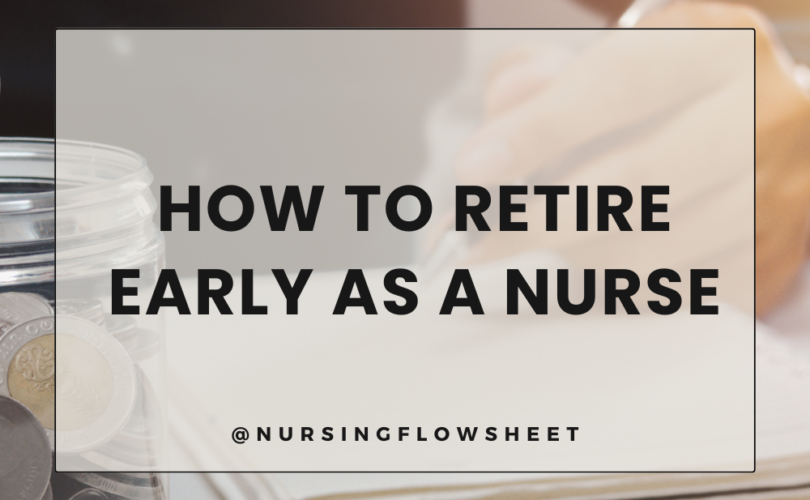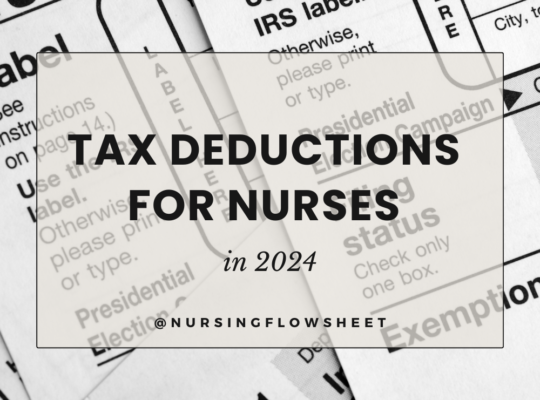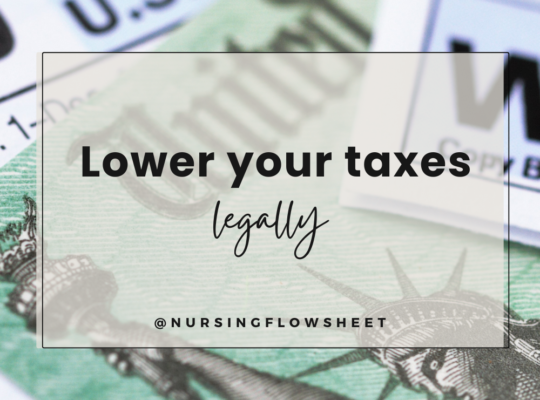If you are a nurse and wondering if it’s possible to retire early, youre in the right place! Retiring early is a dream many individuals cherish, but for nurses, it often seems like an unattainable goal due to the demanding nature of the profession and the perceived limitations in earning potential.
However, contrary to popular belief, early retirement is within reach for nurses with careful planning, disciplined saving, and strategic investing.
When I was a new grad nurse, I though that bedside nursing and working is something that I’d have to do until I am 60+ years old. I always thought that the only path to being successful is working hard and retiring after working for 40 years or so. The past 5-6 years, I learned financial literacy and realized that there is a way to retire early as a nurse.
What is Early Retirement?
Before diving into the specifics, it’s essential to grasp the concept of early retirement. When you look up the word “retirement” online, you’ll often find an image of two grey-haired elderly people enjoying their time at the beach. The retirement age right now in the United States is 67 years old. Social Security benefits starts at 62 years old.
Unlike traditional retirement, which typically occurs in one’s 60s, early retirement involves leaving the workforce at a younger age, often in one’s 40s or 50s. I don’t know about you, but I don’t want to wait that long to enjoy my hard-earned money as a nurse. This is why Early Retirement has been a goal of mine.
Set Your Retirement Goals
The first step towards early retirement is setting clear and achievable goals. Define your retirement age, desired lifestyle, and anticipated expenses during retirement. As a nurse, consider factors such as healthcare costs, inflation, and potential caregiving responsibilities for family members. Having a clear vision of your retirement goals will guide your financial decisions and help you stay focused on your objectives.
Increase Your Income
Increasing your income is crucial for accelerating your journey towards early retirement. I have mentioned that the hardest milestone with investing is getting to your first $100K and the reason for that is because achieving this will rely heavily on how high your savings rate is.
While nurses typically earn competitive salaries, there are several strategies to boost your income further:
- Pursue Advanced Certifications: Specialized certifications, such as becoming a nurse practitioner or nurse anesthetist, can significantly increase your earning potential.
- Explore Additional Opportunities: Take advantage of overtime shifts, per diem work, or freelance nursing opportunities to supplement your income.
- Invest in Professional Development: Continuously invest in your skills and education to qualify for higher-paying positions or leadership roles within healthcare organizations.
- Side Hustles: Consider exploring side businesses or freelance opportunities in healthcare consulting, education, or writing to generate additional income streams. READ: Side Hustles for Nurses
Save and Invest to Retire Early as a Nurse
Saving diligently and investing wisely are cornerstones of achieving early retirement. Here are some actionable tips for nurses to build a robust financial foundation:

- Emergency Fund: Establish an emergency fund with enough savings to cover at least six months’ worth of living expenses. This fund will provide a financial safety net during unexpected emergencies or job transitions.
- Retirement Accounts: Maximize contributions to retirement accounts such as 401(k)s, 403(b)s, or IRAs. Take advantage of employer matching contributions and tax-deferred growth opportunities offered by these accounts. READ: Investment Accounts
- Health Savings Account (HSA): If eligible, contribute to an HSA to save for future healthcare expenses tax-free. HSAs offer triple tax benefits, making them valuable tools for healthcare professionals planning for retirement.
- Diversified Investments: Build a diversified investment portfolio tailored to your risk tolerance, investment horizon, and retirement goals. Consider investing in a mix of stocks, bonds, real estate, and other asset classes to mitigate risk and maximize returns.
- Take Advantage of Tax-Efficient Strategies: Optimize your investment strategy by utilizing tax-efficient investment vehicles such as index funds, ETFs, and tax-loss harvesting techniques to minimize tax liabilities and enhance overall returns.
Pay off Debt
Debt can be a significant obstacle on the path to early retirement. Prioritize debt repayment to free up cash flow and accelerate your savings rate. Here are some strategies for managing debt effectively:
- Prioritize High-Interest Debt: Focus on paying off high-interest debt such as credit card balances or personal loans first. High-interest debt can erode your financial health and hinder your progress towards retirement.
- Refinance Student Loans: Explore options to refinance student loans at lower interest rates to reduce monthly payments and total interest costs over time.
- Budgeting and Expense Tracking: Implement a budgeting system and track your expenses diligently to identify areas where you can cut costs and allocate more funds towards debt repayment and savings.
- Avoid Lifestyle Inflation: Resist the temptation to inflate your lifestyle as your income increases. Instead, maintain a modest lifestyle and allocate extra income towards debt repayment and retirement savings.
Importance of Having Passive Income
Creating passive income streams is essential for achieving financial independence and early retirement. Passive income sources generate recurring revenue with minimal ongoing effort, providing financial stability and flexibility during retirement. Here are some passive income ideas for nurses:
- Rental Properties: Invest in rental properties or real estate crowdfunding platforms to generate rental income and build equity over time.
- Dividend Stocks: Invest in dividend-paying stocks or dividend-focused mutual funds to earn regular income from your investment portfolio.
- Peer-to-Peer Lending: Participate in peer-to-peer lending platforms to earn interest income by lending money to borrowers.
- Royalties and Licensing: Monetize your expertise by writing books, creating online courses, or licensing intellectual property to generate passive income.
- Retirement Annuities: Consider purchasing retirement annuities or structured settlement payments to receive guaranteed income during retirement.
Building your Dream Life
While striving for early retirement, it’s essential to prioritize your physical and mental well-being. Nursing can be physically and emotionally demanding, so it’s crucial to maintain a healthy work-life balance to avoid burnout and sustain your long-term career aspirations. Here are some tips for achieving a healthy work-life balance:
- Set Boundaries: Establish clear boundaries between work and personal life to prevent work-related stress from encroaching on your downtime.
- Practice Self-Care: Prioritize self-care activities such as exercise, meditation, and hobbies to recharge and rejuvenate outside of work.
- Delegate and Collaborate: Delegate tasks when possible and collaborate with colleagues to share the workload and prevent burnout.
- Take Regular Breaks: Schedule regular breaks throughout your workday to rest and recharge, allowing yourself to return to work with renewed energy and focus.
- Seek Support: Don’t hesitate to seek support from friends, family, or mental health professionals if you’re feeling overwhelmed or stressed.
Conclusion: Achieving early retirement as a nurse is an achievable goal with careful planning, disciplined saving, and strategic investing. By setting clear goals, maximizing income, saving and investing wisely, managing debt, building passive income streams, and maintaining a healthy work-life balance, nurses can create a path towards financial independence and retire early on their own terms. Start taking actionable steps today to turn your early retirement dreams into reality.






[…] Read How to Retire Early as a Nurse […]